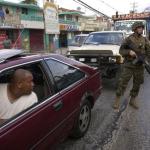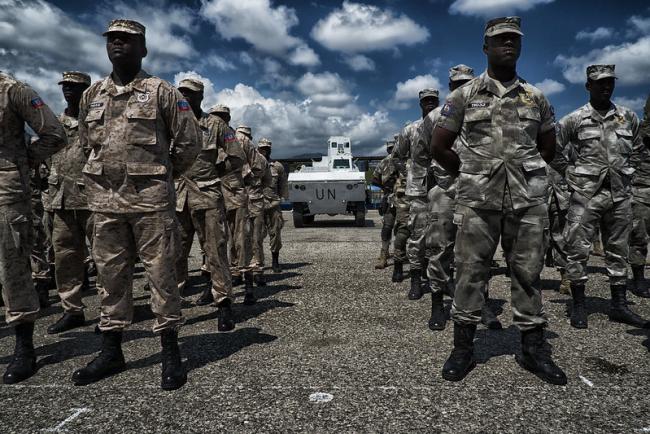A Legacy of Canadian Intervention in Haiti, 20 Years On

In January 2003, Haitians were in the midst of planning celebrations for their bicentennial liberation from the white slavers of Spain, Britain, and France. Famous Black actors, activists, and intellectuals like Danny Glover, Dr. Molefi Asante, and South African President Thabo Mbeki, together with progressive minds of all shades and origins, were making plans to travel to Haiti. At the same time, a group of white women and men gathered with very different plans at a Canadian government resort.
Adding to a long history of foreign conferences on “fixing Haiti” with catastrophic consequences, the Ottawa Initiative on Haiti (OIH) took place near my hometown on January 31-February 1, 2003. At the invitation of Prime Minister Jean Chrétien’s Liberals, the event brought together officials from the United States, France, and the Organization of American States (OAS) to discuss ousting Haiti’s democratically elected president, establishing a Kosovo-like trusteeship, and reinstating the U.S.-subservient Haitian armed forces. As Canada and the United States now consider another round of foreign intervention in Haiti, remembering the OIH’s immense impacts and legacy is crucial. As a result of those talks, the people of my native land went from having 7,000 duly-elected officials 20 years ago, to none today.
In his March 2003 article, “Haiti put under U.N. Tutelage?,” Michel Vastel described how parliamentarians of former colonial powers present at the OIH framed their plans in terms of a “Responsibility to Protect” (R2P). Thirteen months later, on February 29, 2004, while Canadian soldiers stood guard over Toussaint Louverture International Airport, U.S. officials forced Haiti’s president and first lady into an airplane. According to renowned African American author and activist Randall Robinson, President Jean-Bertrand Aristide and his wife Mildred were effectively abducted against their will.
Soon after the brutal coup, a UN force known as MINUSTAH launched an occupation of the Caribbean nation that continued for 13 years. MINUSTAH engaged in widespread sexual misconduct, carried out extrajudicial killings, and, through reckless sanitation practices, introduced cholera to the country, which killed as many as 50,000, according to scientific studies. The documentary film Haiti: we must kill the bandits by journalist Kevin Pina is essential educational material for this period of history.
Barbaric as it was, the 2004 coup’s brazen act of terrorism was unique only in its details. Black Haitians form a nation which is permanently under attack by white arsonists dressed as firefighters. As activist Vélina Charlier said at a U.S. hearing on Haiti in September 2022: “When we have boots on the ground, we get raped, we get cholera…There are honest Haitians with integrity, who are competent to run our country, but we never get the chance because the U.S. keeps its hand on the scale, supporting corrupt governments and making it impossible for a Haitian solution to emerge.”
I arrived in Ottawa with my parents in mid-April 1983. Two days later, an excited teenager experiencing beautiful falling snow for the first time, I attempted to describe for former school mates, now pen pals in Haiti, the concept of living under “below zero” temperatures. Forty years later, Haiti appears to have reached its own “below zero.” There are no legitimate elected officials at the helm and no evident plan to organize credible elections in the UN-occupied country. Meanwhile, gangs of kidnappers and their foreign-appointed political allies claim all powers.
Fixing Black Haiti: A White Obsession
At the end of January, mayhem engulfed the streets of Port-au-Prince. Police officers who have seen several of their comrades killed by government-allied paramilitary bandits (aka gangs) are angry. But, to whom might they address their just grievances? The de facto prime minister, Ariel Henry, is no more accountable than Police Chief Frantz Elbe. Members of the international community in Haiti, known as the Core Group, make all key decisions about Haiti’s future but shoulder zero accountability for any resulting mess.
The 2003 OIH was a precursor to the Core Group, which is made up of ambassadors of the United States, Canada, France, Brazil, Spain, and Germany as well as representatives of the European Union, United Nations, and Organization of American States. Functioning as de facto overlords, since 2004, the Core Group has propped up successive regimes of illegal “rulers” in Haiti. Presidents Jovenel Moïse and Michel Martelly, both of the Haitian Tèt Kale Party (PHTK), were selected through fraud and violence in 2017 and 2011, respectively.
More recently, following the brazen assassination of Moïse on July 7, 2021, the Core Group anointed Henry as prime minister, despite calls from Haitian civil society to organize a transition government with different leadership. The PHTK, including Henry, has failed to organize elections, leaving the country with no elected officials after the terms of the last 10 senators expired in early January. Moïse had been ruling by decree for more than a year at the time of his assassination due to the lack of legislative elections.
Time and again, Haitians chose visionary leaders like founder Jean-Jacques Dessalines (1804), Lysius Salomon (1879), Dumarsais Estimé (1946), Daniel Fignolé (1957), and Aristide (1990). Yet these leaders were each viciously attacked and Haiti’s treasury ransacked, subjected to outrageous ransoms collected by invaders. For instance, the sum France collected between 1825 and 1947 as an “indemnity” for freedom from slavery represents well over $100 billion, even if calculated at minimal interest rates. This was just one of many episodes of gun-boat diplomacy against Haiti, which together with a history of white solidarity among the colonial powers, deprived Haiti of its precious resources.
In a recent article discussing how to “fix Haiti,” author Bertrand Laurent writes: “To have long term effect, a winning strategy would target not only the gangs but also corrupt business forces and the high-level corrupt politicians in Haiti along with their international enablers, money launderers, and weapons suppliers.” We must probe who these forces are and what has rendered them untouchable all these decades.

UN troops from the MINUSTAH operation that occupied Haiti for 13 years stand in formation during a 2015 ceremony in Port-au-Prince. (Logan Abassi / United Nations / CC BY-NC-ND 2.0)
Foreign Intervention Revisited
In October, Henry appealed to the international community to militarily intervene in Haiti. Canada has since sent two shipments of armored vehicles to Haiti, while a fact-finding mission is assessing Ottawa’s next steps. Canada’s UN Ambassador, Bob Rae, who is advising the Canadian government on the situation in Haiti, told CBC: "We are not interested in repeating the mistakes of the past." Yet Rae has expressed support for re-mobilizing the defunct Forces Armées d’Haiti (FAdH). This position, notes author and activist Yeves Engler, is blind to Haitian history.
"Originally established during the US occupation of 1915–34, FAdH was created to crush resistance to the US presence,” Engler writes. “The army, notes Haitian historian Michel-Rolph Trouillot, ‘never fought anyone but Haitians.’” During the 1957 military coup against leftist president Fignolé alone, the FAdH killed as many as 500 people in the Port-au-Prince neighborhoods of La Saline and Bel Air for protesting.
The real motivation to resurrect the FAdH is plain and simple. Imperialist forces and their allies on the island require forces of repression to maintain the established “dis-order”—that is, keeping the Black masses in check under socio-economic racial apartheid.
On December 5, 2022, with much fanfare, Canada announced sanctions against Haitian billionaire Gilbert Bigio and fellow businessmen Sherif Abdallah and Reynold Deeb over links to gangs. Previously, Ottawa sanctioned former presidents Martelly and Laurent Lamothe, and others, for the same reason. Yet the sanctions announcements are a mere smokescreen. As I told CBC News (although my comments were not aired) in response to the PHTK regime’s purchase of armoured vehicles from Canadian manufacturers, the risk that these Canadian death machines end up in the hands of the very people—gang warlords—that Prime Minister Justin Trudeau claims to hit with sanctions is very high.
A Call for Sovereignty and Solidarity
The historical record demonstrates that the foreign, white supremacist intervention that is sporadically proposed as a potential means to “fix” Haiti is, in fact, the primary ill plaguing my beleaguered native country. Instead of making amends by paying long-overdue reparations, imperialists press on with the OIH playbook. As it stands in Haiti, no election has been called, the streets are reputedly too dangerous for schools to operate, yet PHTK-allied politicians like former acting prime minister Claude Joseph have been campaigning.
Whenever the racist undertones of their actions become problematic, imperialists are prone to resort to Black enablers. In recent months, African and Caribbean leaders have been actively courted to join another invasion of Haiti, charged with an obviously inadmissible goal: salvaging an established neocolonial disorder or, as dubbed in popular Haitian lingua, “Sistèm nan” (The System).
What ought to be done, now? As often expressed by Solidarite Québec Haiti, the PHTK is a terrorist organization of which any current and past leader, minister, or accomplice is considered collectively and individually suspect of multiple blood crimes, financial crimes, crimes against humanity, and/or crimes of high treason against their nation. They must be arrested and judged accordingly.
The people of Haiti deserve, need, and demand global solidarity to help prosecute and convict all warlords and their associates, regardless of skin color and nationality. If found guilty, all assets of actors like Martelly, Lamothe, Bigio, Deeb, Abdallah, and others must be nationalized. With the recuperated stolen assets, the nation could establish a Haiti Building Fund that legitimate Haitian governments could, henceforth, access for the national budget.
Canada, the United States, European Union, OAS, and UN must finally normalize their dysfunctional relationship with Haiti. This means in plain English respecting Haitian nationhood and treating Black Haitians as they do white Europeans.
Finally, as Bloc Québécois member of parliament Mario Beaulieu presented by petition in the House of Commons on March 22, 2021, Canada must finally publish all (uncensored) documents relating to the Ottawa Initiative on Haiti, including its link to the Core Group. The government’s dismissive response to the request was both unacceptable and shameful.
At the end of the 19th century, as it conspired to steal Haiti’s Mole St-Nicolas, the U.S. Government briefly called upon famous abolitionist Frederick Douglass to serve as “U.S. Ambassador to Hayti.” Two years later, in July 1891, Douglass resigned in disgust at U.S. policy. By his dignified behaviour, Douglass taught us that, whereas taming the wickedness of racist imperialists might be beyond our individual powers, behaving honourably towards one’s ancestors and people remains forever a sacred duty.
Note: An extended version of this article is available on Jafrikayiti.com.
Jean Saint-Vil, also known as Jafrikayiti, is a political analyst and artist-activist. He is cofounder of two self-help organizations, AKASAN (Ayisyen ki ap soutni Ayisyen nètalkole) and Jaku Konbit, and host or co-host of several weekly radio programs focused on Haiti. He writes at jafrikayiti.com.
For over 50 years, NACLA has been a leading source of English-language news and analysis on Latin America. With your support, we pledge to continue our mission of furthering hemispheric solidarity through original reporting and in-depth coverage of the region, on the web and in print. Donate
